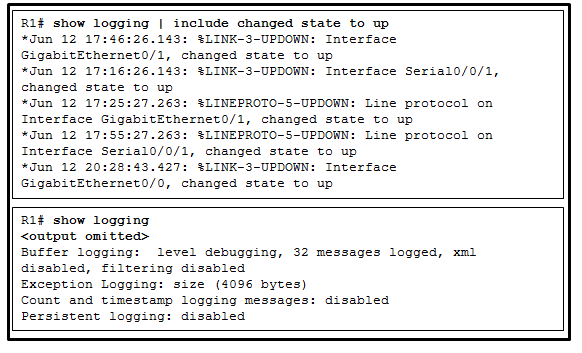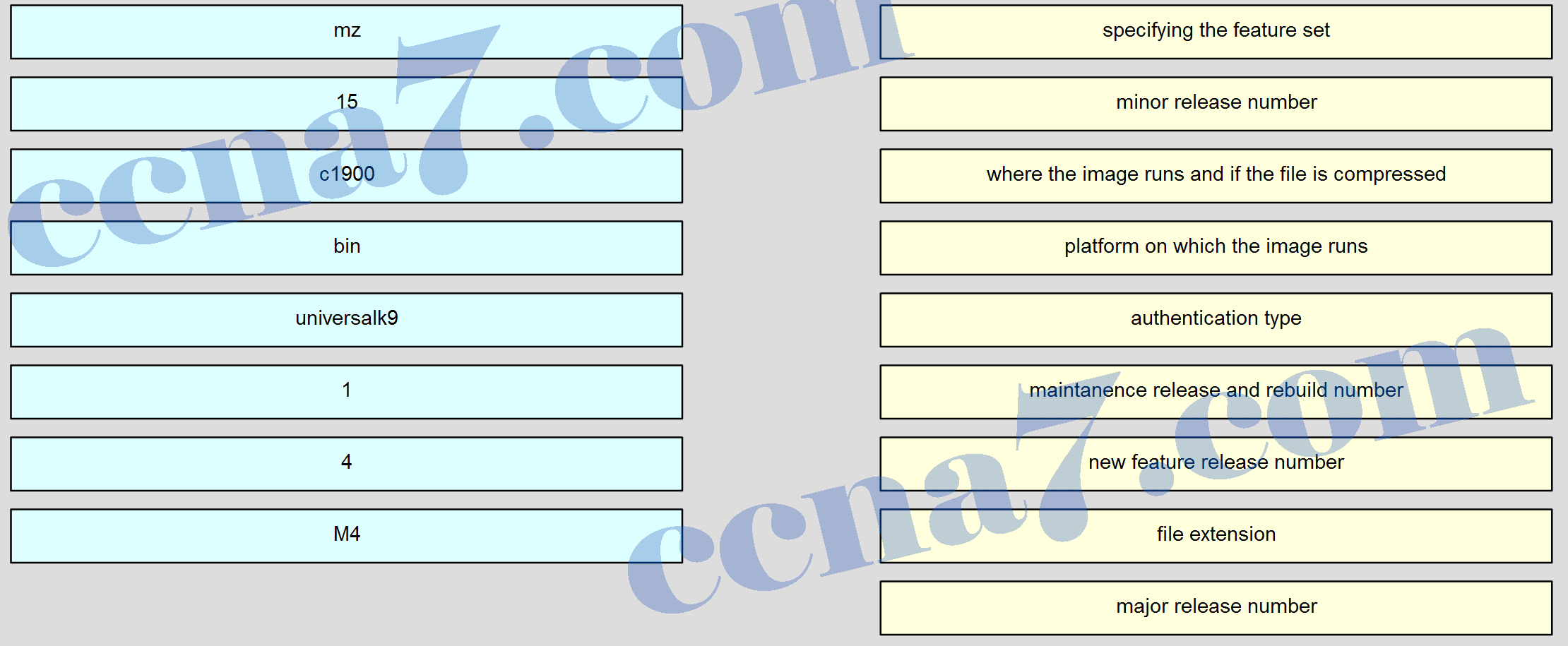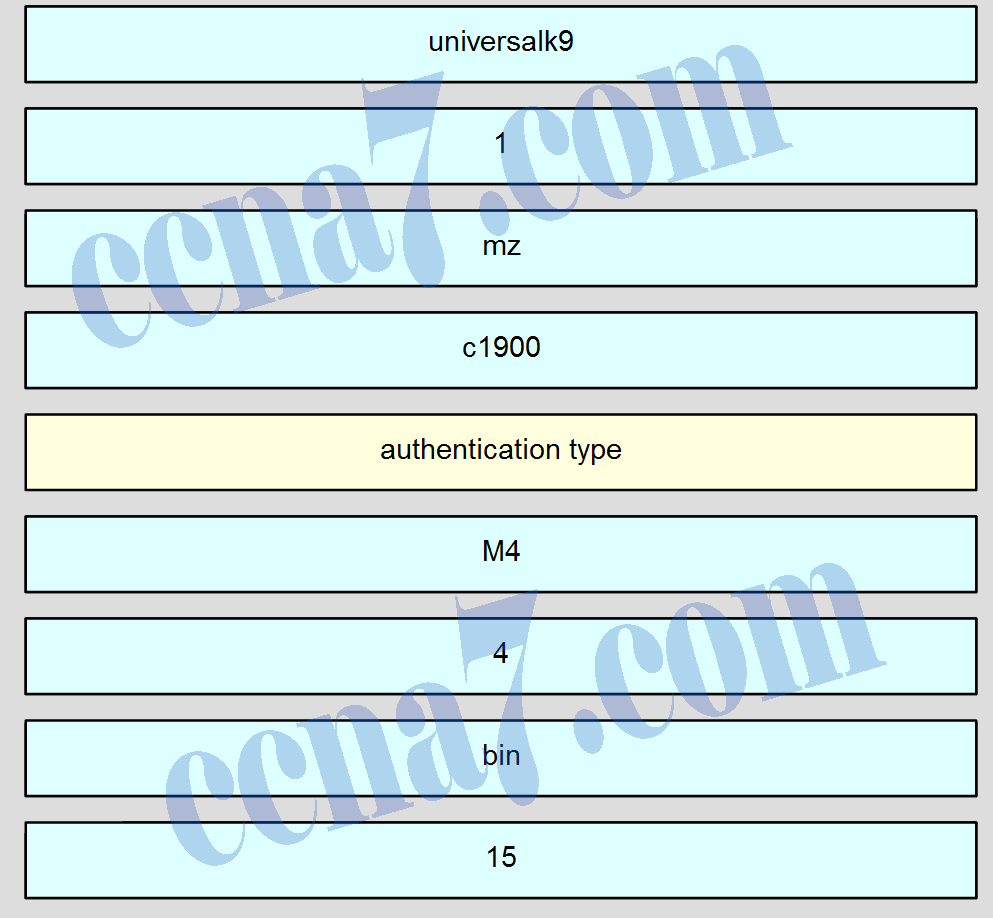Last Updated on October 25, 2019 by Admin
CCNA2 v6.0 Chapter 10 Exam Answers 2018 2019
From year to year, Cisco has updated many versions with difference questions. The latest version is version 6.0 in 2018. What is your version? It depends on your instructor creating your class. We recommend you to go thought all version if you are not clear. While you take online test with netacad.com, You may get random questions from all version. Each version have 1 to 10 different questions or more. After you review all questions, You should practice with our online test system by go to "Online Test" link below.
-
A ping fails when performed from router R1 to directly connected router R2. The network administrator then proceeds to issue the show cdp neighbors command. Why would the network administrator issue this command if the ping failed between the two routers?
- The network administrator suspects a virus because the ping command did not work.
- The network administrator wants to verify Layer 2 connectivity.
- The network administrator wants to verify the IP address configured on router R2.
- The network administrator wants to determine if connectivity can be established from a non-directly connected network.
Explanation: The show cdp neighbors command can be used to prove that Layer 1 and Layer 2 connectivity exists between two Cisco devices. For example, if two devices have duplicate IP addresses, a ping between the devices will fail, but the output of show cdp neighbors will be successful. The show cdp neighbors detail could be used to verify the IP address of the directly connected device in case the same IP address is assigned to the two routers.
-
Which statement is true about CDP on a Cisco device?
- The show cdp neighbor detail command will reveal the IP address of a neighbor only if there is Layer 3 connectivity.
- To disable CDP globally, the no cdp enable command in interface configuration mode must be used.
- CDP can be disabled globally or on a specific interface.
- Because it runs at the data link layer, the CDP protocol can only be implemented in switches.
Explanation: CDP is a Cisco-proprietary protocol that can be disabled globally by using the no cdp run global configuration command, or disabled on a specific interface, by using the no cdp enable interface configuration command. Because CDP operates at the data link layer, two or more Cisco network devices, such as routers can learn about each other even if Layer 3 connectivity does not exist. The show cdp neighbors detail command reveals the IP address of a neighboring device regardless of whether you can ping the neighbor.
-
Why would a network administrator issue the show cdp neigbors command on a router?
- to display device ID and other information about directly connected Cisco devices
- to display router ID and other information about OSPF neighbors
- to display line status and other information about directly connected Cisco devices
- to display routing table and other information about directly connected Cisco devices
Explanation: The show cdp neighbors command provides information on directly connected Cisco devices including Device ID, local interface, capability, platform, and port ID of the remote device.
-
Refer to the exhibit. Routers R1 and R2 are connected via a serial link. One router is configured as the NTP master, and the other is an NTP client. Which two pieces of information can be obtained from the partial output of the show ntp associations detail command on R2? (Choose two.)

CCNA 2 RSE 6.0 Chapter 10 Exam Answers 2018 2019 01
- Both routers are configured to use NTPv2.
- Router R1 is the master, and R2 is the client.
- Router R2 is the master, and R1 is the client.
- The IP address of R1 is 192.168.1.2.
- The IP address of R2 is 192.168.1.2.
Explanation: With the show NTP associations command, the IP address of the NTP master is given.
-
Which two statements are true about NTP servers in an enterprise network? (Choose two.)
- There can only be one NTP server on an enterprise network.
- All NTP servers synchronize directly to a stratum 1 time source.
- NTP servers at stratum 1 are directly connected to an authoritative time source.
- NTP servers ensure an accurate time stamp on logging and debugging information.
- NTP servers control the mean time between failures (MTBF) for key network devices.
Explanation: Network Time Protocol (NTP) is used to synchronize the time across all devices on the network to make sure accurate timestamping on devices for managing, securing and troubleshooting. NTP networks use a hierarchical system of time sources. Each level in this hierarchical system is called a stratum. The stratum 1 devices are directly connected to the authoritative time sources.
-
The command ntp server 10.1.1.1 is issued on a router. What impact does this command have?
- determines which server to send system log files to
- identifies the server on which to store backup configurations
- ensures that all logging will have a time stamp associated with it
- synchronizes the system clock with the time source with IP address 10.1.1.1
Explanation: The ntp server ip-address global configuration command configures the NTP server for IOS devices.
-
Refer to the exhibit. Which two conclusions can be drawn from the syslog message that was generated by the router? (Choose two.)

CCNA 2 RSE 6.0 Chapter 10 Exam Answers 2018 2019 02
- This message resulted from an unusual error requiring reconfiguration of the interface.
- This message indicates that the interface should be replaced.
- This message is a level 5 notification message.
- This message indicates that service timestamps have been configured.
- This message indicates that the interface changed state five times.
Explanation: The message is a level 5 notification message as shown in the %LINEPROTO-5 section of the output. Messages reporting the link status are common and do not require replacing the interface or reconfiguring the interface. The date and time displayed at the beginning of the message indicates that service timestamps have been configured on the router.
-
Which protocol or service allows network administrators to receive system messages that are provided by network devices?
- syslog
- NTP
- SNMP
- NetFlow
Explanation: Cisco developed NetFlow for the purpose of gathering statistics on packets flowing through Cisco routers and multilayer switches. SNMP can be used to collect and store information about a device. Syslog is used to access and store system messages.
NTP is used to allow network devices to synchronize time settings.
-
Which syslog message type is accessible only to an administrator and only via the Cisco CLI?
- errors
- debugging
- emergency
- alerts
Explanation: Syslog messages can be sent to the logging buffer, the console line, the terminal line, or to a syslog server. However, debug-level messages are only forwarded to the internal buffer and only accessible through the Cisco CLI.
-
Refer to the exhibit. From what location have the syslog messages been retrieved?

CCNA 2 RSE 6.0 Chapter 10 Exam Answers 2018 2019 04
- syslog server
- syslog client
- router RAM
- router NVRAM
Explanation: The output is captured from a virtual terminal connection on a router. The syslog messages are stored in the RAM of the monitored router.
-
Refer to the exhibit. What does the number 17:46:26.143 represent?

CCNA 2 RSE 6.0 Chapter 10 Exam Answers 2018 2019 03
- the time passed since the syslog server has been started
- the time when the syslog message was issued
- the time passed since the interfaces have been up
- the time on the router when the show logging command was issued
Explanation: The number following the date represents the time that the syslog message was issued.
-
What is used as the default event logging destination for Cisco routers and switches?
- terminal line
- syslog server
- console line
- workstation
Explanation: By default, Cisco routers and switches send event messages to the console. Various IOS versions will also send their event messages to the buffer by default. Specific commands must be implemented to allow logging to other locations.
-
A network administrator has issued the logging trap 4 global configuration mode command. What is the result of this command?
- After four events, the syslog client will send an event message to the syslog server.
- The syslog client will send to the syslog server any event message that has a severity level of 4 and higher.
- The syslog client will send to the syslog server any event message that has a severity level of 4 and lower.
- The syslog client will send to the syslog server event messages with an identification trap level of only 4.
Explanation: The logging trap level allows a network administrator to limit event messages that are being sent to a syslog server based on severity.
-
What is the major release number in the IOS image name c1900-universalk9-mz.SPA.152-3.T.bin?
- 2
- 3
- 15
- 52
- 190
Explanation: The part of the image name 152-3 indicates that the major release is 15, the minor release is 2, and the new feature release is 3.
-
What statement describes a Cisco IOS image with the “universalk9_npe” designation for Cisco ISR G2 routers?
- It is an IOS version that can only be used in the United States of America.
- It is an IOS version that provides only the IPBase feature set.
- It is an IOS version that offers all of the Cisco IOS Software feature sets.
- It is an IOS version that, at the request of some countries, removes any strong cryptographic functionality.
Explanation: To support Cisco ISR G2 platforms, Cisco provides two types of universal images. The images with the “universalk9_npe” designation in the image name do not support any strong cryptography functionality such as payload cryptography to satisfy the import requirements of some countries. The “universalk9_npe” images include all other Cisco IOS software features.
-
What code in the Cisco IOS 15 image filename c1900-universalk9-mz.SPA.153-3.M.bin indicates that the file is digitally signed by Cisco?
- SPA
- universalk9
- M
- mz
Explanation: The different parts of the Cisco IOS image file are as follows:
c1900 – Identifies the platform as a Cisco 1900 router.
universalk9 – specifies the image contains strong encryption.
mz – Indicates the file runs from RAM and is compressed.
SPA – designates that the file is digitally signed by Cisco.
152-4.M3 – specifies the filename format for the image 15.2(4)M3. This is the version of IOS, which includes the major release, minor release, maintenance release, and maintenance rebuild numbers. The M indicates this is an extended maintenance release.
bin – This extension indicates that this file is a binary executable file.
-
Which two conditions should the network administrator verify before attempting to upgrade a Cisco IOS image using a TFTP server? (Choose two.)
- Verify the name of the TFTP server using the show hosts command.
- Verify that the TFTP server is running using the tftpdnld command.
- Verify that the checksum for the image is valid using the show version command.
- Verify connectivity between the router and TFTP server using the ping command.
- Verify that there is enough flash memory for the new Cisco IOS image using the show flash command.
-
A network administrator configures a router with the command sequence:
R1(config)# boot system tftp://c1900-universalk9-mz.SPA.152-4.M3.bin
R1(config)# boot system romWhat is the effect of the command sequence?
- On next reboot, the router will load the IOS image from ROM.
- The router will copy the IOS image from the TFTP server and then reboot the system.
- The router will load IOS from the TFTP server. If the image fails to load, it will load the IOS image from ROM.
- The router will search and load a valid IOS image in the sequence of flash, TFTP, and ROM.
Explanation: The boot system command is a global configuration command that allows the user to specify the source for the Cisco IOS Software image to load. In this case, the router is configured to boot from the IOS image that is stored on the TFTP server and will use the ROMmon imagethat is located in the ROM if it fails to locate the TFTP server or fails to load a valid image from the TFTP server.
-
A network engineer is upgrading the Cisco IOS image on a 2900 series ISR. What command could the engineer use to verify the total amount of flash memory as well as how much flash memory is currently available?
- show flash0:
- show version
- show interfaces
- show startup-config
-
Beginning with the Cisco IOS Software Release 15.0, which license is a prerequisite for installing additional technology pack licenses?
- IPBase
- DATA
- UC
- SEC
Explanation: Cisco IOS Software release 15.0 incorporates four technology packs. They are IPBase, DATA, UC (unified Communications), and SEC (Security). Having the IPBase license installed is a prerequisite for installing the other technology packs.
-
Which three software packages are available for Cisco IOS Release 15.0?
- DATA
- IPVoice
- Security
- Enterprise Services
- Unified Communications
- Advanced IP Services
Explanation: Cisco IOS Release 15.0 has four available technology software packages.IPBase
- DATA
- Unified Communications
- Security
-
When a customer purchases a Cisco IOS 15.0 software package, what serves as the receipt for that customer and is used to obtain the license as well?
- Software Claim Certificate
- End User License Agreement
- Unique Device Identifier
- Product Activation Key
Explanation: A customer who purchases a software package will receive a Product Activation Key (PAK) that serves as a receipt and is used to obtain the license for the software package.
-
In addition to IPBase, what are the three technology packs that are shipped within the universal Cisco IOS Software Release 15 image? (Choose three.)
- Advanced IP Services
- Advanced Enterprise Services
- DATA
- Security
- SP Services
- Unified Communications
Explanation: Advanced IP Services, Advanced Enterprise Services, and SP Services are IOS release 12.4 feature sets.
-
Which command would a network engineer use to find the unique device identifier of a Cisco router?
- show version
- show license udi
- show running-configuration
- license install stored-location-url
Explanation: The license install stored-location-url command is used to install a license file. The show version and show running-configuration commands display router configuration and other details, but not the UDI.
-
Which command is used to configure a one-time acceptance of the EULA for all Cisco IOS software packages and features?
- license save
- show license
- license boot module module-name
- license accept end user agreement
Explanation: The license save command is used to back up a copy of the licenses on a device. The show license command is used to display additional information about Cisco IOS software licenses. The license boot module module-name command activates an Evaluation Right-To-Use license. To configure a one-time acceptance of the End User License Agreement (EULA) covering all Cisco IOS packages and features, use the license accept end user agreement command.
-
Refer to the exhibit. Match the components of the IOS image name to their description. (Not all options are used.)

CCNA 2 RSE 6.0 Chapter 10 Exam Answers 2018 2019 05
- Question

CCNA2 v6.0 Chapter 10 Exam Q001
- Answer

CCNA2 v6.0 Chapter 10 Exam A001
- Question
From year to year, Cisco has updated many versions with difference questions. The latest version is version 6.0 in 2018. What is your version? It depends on your instructor creating your class. We recommend you to go thought all version if you are not clear. While you take online test with netacad.com, You may get random questions from all version. Each version have 1 to 10 different questions or more. After you review all questions, You should practice with our online test system by go to "Online Test" link below.